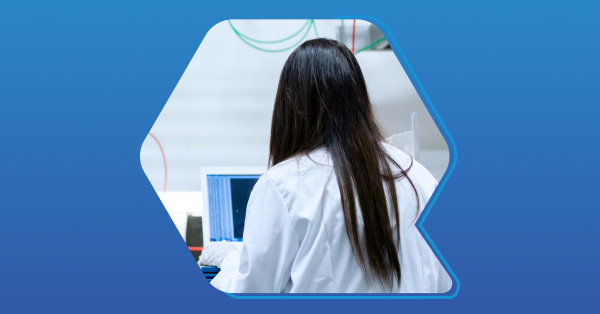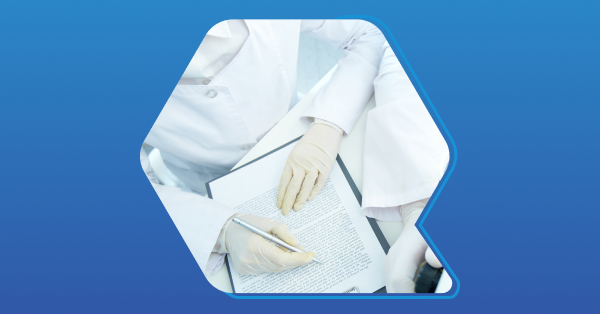Everything Labs Need to Know about GxP Compliance

Safety is critical for any lab, but labs in regulated industries (such as pharmaceuticals, food and beverage, or biotech) must comply with specific quality guidelines and standards.
The best way to demonstrate that your lab takes safety and compliance seriously is through GxP. GxP covers a variety of good practices standards that apply to labs across industries from medical to pharmaceutical. In this article, we’ll explore what GxP is, why it matters, and how to meet these standards in your lab.
What is GXP?
Originally established by the FDA, GxP standards are intended to ensure products produced by labs are safe, meet their intended use, and follow quality processes as they are manufactured.
GxP is a generic term that covers several industry best practices. You can think of GxP as “Good <fill in an industry> Practice” which lays out a series of standards and guidelines to follow.
Within GxP, there are several specific guidelines, such as:
- GMP – Good Manufacturing Practice, often referred to as cGMP (current Good Manufacturing Practices)
- GLP – Good Laboratory Practice
- GdocP – Good Documentation Practices
- GDP – Good Distribution Practice
- GCP – Good Clinical Practice
- GRP – Good Review practice
- GSP – Good Storage Practice
For the sake of this article, we’ll use the more generic “GxP” when talking about good practices in labs. GxP guidelines are designed to ensure that your lab’s products, tests, and results meet safety and quality standards and are reliable.
These guidelines can be broken down further into:
- Standardization and quality assurance: This ensures that all activities, from research and development to manufacturing, are conducted under controlled conditions, reducing the risk of errors or contamination. Quality assurance is a key component, ensuring that the data and results generated are reliable and reproducible.
- Documentation and record-keeping: Every aspect of the laboratory processes, from the handling of materials to the details of experiments, must be recorded. This documentation ensures traceability, allowing for the identification and rectification of any issues that arise during the development and testing phases.
- Staff training and competency: This involves initial training and also continuous education to keep up with the latest industry standards and practices. Ensuring that staff are skilled and knowledgeable reduces the risk of non-compliance and enhances the quality of work.
- Audit and inspection readiness: Laboratories that adhere to GXP guidelines are always prepared for audits and inspections. Regulatory bodies can conduct these inspections without prior notice, and compliance with GXP standards ensures that laboratories can confidently undergo these assessments. Regular internal audits are also part of GXP compliance, helping identify and rectify any potential non-compliance issues proactively.
- Risk management: GXP encompasses risk management principles to identify, analyze, and mitigate risks associated with laboratory practices. This proactive approach ensures that potential issues are addressed before they can impact the safety, quality, or efficacy of the products being developed or tested.
- Continuous improvement: GXP promotes a culture of continuous improvement. Feedback from audits, inspections, and day-to-day operations is used to refine and enhance laboratory practices. This not only aids in maintaining compliance but also drives innovation and efficiency in laboratory operations.
Which Labs Does GxP Apply to?
While every lab should make an effort to be organized and follow industry best practices, GxP specifically applies to labs in several regulated industries.
Here are some key types of labs and areas where GxP is applicable:
- Pharmaceutical Laboratories
- Clinical Research Laboratories
- Biotechnology Laboratories
- Medical Device Manufacturers
- Food and Beverage Industry Laboratories
- Environmental Laboratories
- Cosmetics Laboratories
- Quality Control Laboratories
Why GXP Matters for Labs
GxP isn’t a firm requirement; however, certain elements of GxP may be required to meet compliance standards in your industry.
Adherence to GxP demonstrates that lab results are auditable, processes are documented, data is managed correctly, and best practices are followed in the lab. These elements of GxP crucial for ensuring the integrity, safety, and efficacy of products and services.
Here's why GXP is so significant:
- Safety: GxP ensures that your lab follows best practices to create a safe environment for your staff and protect your data.
- Quality: GxP guidelines ensure the quality of your work and processes, as well as having plans in place to manage quality control issues.
- Reputation and trust: Meeting GxP guidelines improves your lab’s reputation and builds trust within your industry.
- Data integrity: Meeting GxP guidelines ensures the integrity and reliability of your data. This helps to prevent errors and meet certain compliance standards.
What Are the GxP Guidelines For Labs?
GxP is about process - whether that be the process of manufacturing pharmaceutical products or the process of running clinical tests. GxP helps to ensure consistent quality, the accuracy of your data and results, and the safety of your lab,
We’ll cover three specific sets of guidelines that are most applicable to labs:
- GMP
- GLP
- GCP
GMP Guidelines for Labs
For pharmaceutical manufacturers, GMP regulations are designed to guarantee the quality and integrity of your products.
These guidelines cover the entire manufacturing process, from sourcing of materials to manufacturing line operation. They also cover the cleanliness of your facility and the training of your staff. The goal of GMP guidelines is to prevent errors and ensure safety in the manufacturing process. FDA 21 CFR Parts 210 and 211 are the two regulatory guidelines you should explore here for more information.
GLP Guidelines for Labs
Good Laboratory Practice (GLP) is a set of principles intended to assure the quality and integrity of non-clinical laboratory studies, such as environmental toxicity and chemical safety testing. GLP emphasizes a clean, orderly, and controlled laboratory with uniform, reliable processes that deliver high-quality outputs and conclusions.
GCP Guidelines for Labs
Like GLP, GCP is an international standard for designing, conducting, recording, and reporting trials that involve the participation of human subjects. These guidelines apply specifically to labs running clinical trials and studies. GCP guidelines ensure that clinical trials are performed dependably and ethically. GCP guidelines cover clinical trial conduct, trial monitoring, and the documentation of trial data in detail.
How a LIMS Can Help Your Lab Meet GxP Guidelines
Meeting GxP standards manually is a daunting task, however, a LIMS (Laboratory Information Management System) can be an invaluable tool for helping your lab meet GxP requirements.
What is a LIMS?
A LIMS is a platform that modern labs can use to manage and track samples, data, and workflows and integrate other software and instruments. By streamlining laboratory operations, they increase efficiency, allowing labs to grow.
A LIMS can help labs with:
- Sample management
- Test result management
- Quality control
- Automation of workflows and processes
- Reporting and documentation
- Compliance and regulations
As you can see, a lot of this touches on GxP requirements. This makes a LIMS one of the best tools you can use to meet GxP compliance! Read on for the specific ways a LIMS can help your lab.

How a LIMS Helps Labs Attain GxP
A LIMS can help your lab attain GxP in the following ways:
- Data integrity and traceability
- Quality control and assurance
- Document management
- Sample management
- Compliance audit readiness
- Automation
Data Integrity and Traceability
Data management is one of the key features of a LIMS, making it easier to manage, access, and secure your lab's data. This helps your lab with enhancing data integrity, traceability, and other essential elements of GxP.
A LIMS also helps with logging actions and changes in your system, including who made what changes and when. This comprehensive audit trail is crucial for GxP compliance, offering transparent and traceable records that support accountability and data integrity.
Quality Control and Assurance
Not every LIMS has built-in quality control features, but QBench has an integrated QMS giving you all the functionality you’ll need for quality management and control.
These quality control features allow you to standardize workflows, track equipment records and calibration, store documentation, create and update SOPs, and manage quality control issues. These are all essential elements of demonstrating quality control processes and quality assurance for GxP.
Document Management
The ability to manage and create Standard Operating Procedures (SOPs), testing protocols, and other key documents is a key benefit of a LIMS in meeting GxP. Recall that compliance with GxP requires adherence to approved SOPs and protocols; managing these documents in a LIMS ensures that your lab’s operations are accessible and followed by your staff.
Sample Management
QBench LIMS provides comprehensive sample management features, from logging samples upon receipt through testing and disposal. This traceability is a cornerstone of GxP, ensuring that all sample-related activities are accurately recorded and traceable. It maintains a detailed chain of custody for samples, documenting every interaction with the sample. Accountability is crucial for GxP compliance, particularly in regulated environments where sample integrity is paramount.
Compliance Audit Readiness
A LIMS can generate reports that meet specific regulatory requirements, facilitating compliance with GxP-related documentation and reporting standards. With a LIMS, laboratories are better prepared for audits and inspections. The system's ability to quickly retrieve data, audit trails, and reports ensures that labs can efficiently respond to auditor requests.
Automation
QBench LIMS provides robust (yet easy-to-use) automation features that allow your lab to automate workflows, automate processes, and reduce the need for manual data entry (check out our guide to what you can automate in your lab with a LIMS).
Automation reduces the risk of errors, and thanks to batch testing automation it allows you to quickly rectify errors as well. This enhancement of accuracy and reliability is in line with GxP's focus on minimizing risks to quality and safety.
Which LIMS is the Best for GxP Compliance?
With so many LIMS platforms on the market, which one will you choose?
While most LIMS will provide features for sample management, reporting, and automation, there’s one LIMS that consistently earns high marks for its ease of use, customization ability, and robust compliance features: QBench LIMS.
QBench LIMS gives modern labs everything they need to meet GxP standards across industries. We support labs with the following:
- Robust sample management features
- Customizable (and easily configurable) no-code automation features
- Reporting features
- A built-in QMS
And more. See why QBench ranks among the best LIMS on the market and start making strides toward GxP compliance today.






